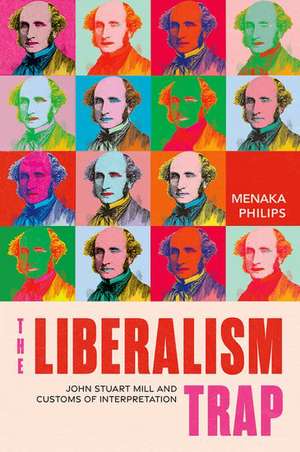The Liberalism Trap: John Stuart Mill and Customs of Interpretation
Autor Menaka Philipsen Limba Engleză Hardback – 11 sep 2023
Preț: 340.79 lei
Preț vechi: 468.44 lei
-27% Nou
Puncte Express: 511
Preț estimativ în valută:
65.21€ • 68.09$ • 53.85£
65.21€ • 68.09$ • 53.85£
Carte disponibilă
Livrare economică 14-20 martie
Preluare comenzi: 021 569.72.76
Specificații
ISBN-13: 9780197658550
ISBN-10: 0197658555
Pagini: 232
Dimensiuni: 237 x 163 x 21 mm
Greutate: 0.51 kg
Editura: Oxford University Press
Colecția OUP USA
Locul publicării:New York, United States
ISBN-10: 0197658555
Pagini: 232
Dimensiuni: 237 x 163 x 21 mm
Greutate: 0.51 kg
Editura: Oxford University Press
Colecția OUP USA
Locul publicării:New York, United States
Recenzii
Philips has achieved an impressive feat. She reexamines John Stuart Mill's innovative but well-trodden theorizing about gender justice, class inequality, democracy, and colonialism in a novel way. With an emphasis on Mill's understanding of uncertainty and his incorporation of radical ideas that transgress liberal orthodoxies—despite his status as a liberal icon—Philips illuminates tensions in Mill's thought to expose the intellectual constraints of liberalism.
In The Liberalism Trap, Menaka Philips offers a superb account of liberalism and its limits. Developing an original reading of John Stuart Mill as an exponent of political uncertainty, while showing how liberalism has come to frame and constrain the political imagination, she makes an important contribution to both intellectual history and methodological debates about the character of political theory.
A brilliant and profoundly original reading of John Stuart Mill's political philosophy, The Liberalism Trap unshackles Mill from the liberal straitjacket to which both admirers and critics have confined him for nearly two centuries. By recovering the subtlety and deep-seated heterodoxy of Mill's uncertain mode of thought, this book offers a welcome reminder of what we miss by treating him as little more than a liberal avatar. At once a disciplinary provocation, methodological intervention, and incisive contribution to scholarship on liberalism and the history of political thought, Philips models the kind of intellectual capaciousness that she draws out of Mill himself. Against our all-too-common lapses into doctrinal certainties, The Liberalism Trap shows us how much we stand to gain by reading what's actually on the page.
The Liberalism Trap is an elegantly constructed and important investigation into both the thought of John Stuart Mill and the status and consequences of the term 'liberalism' as a primary frame for political inquiry and public debate. Drawing on his Autobiography, Menaka Philips stresses the central role of uncertainty in Mill's thought, and traces this through a number of central issues, from women's equality to questions of empire. In so doing, The Liberalism Trap points towards a new understanding of Mill's thought and to the possibilities of political thinking unshackled from the burdens of what we have come to call 'liberalism'.
Phillips makes an excellent case for eschewing the automatic approach of reading Mill through a liberal lens, and does so with many brilliant turns of phrase.
skillfully brings out how qualified that support was and how Mill was committed to Indians' rights and their learning and culture.
In The Liberalism Trap, Menaka Philips offers a superb account of liberalism and its limits. Developing an original reading of John Stuart Mill as an exponent of political uncertainty, while showing how liberalism has come to frame and constrain the political imagination, she makes an important contribution to both intellectual history and methodological debates about the character of political theory.
A brilliant and profoundly original reading of John Stuart Mill's political philosophy, The Liberalism Trap unshackles Mill from the liberal straitjacket to which both admirers and critics have confined him for nearly two centuries. By recovering the subtlety and deep-seated heterodoxy of Mill's uncertain mode of thought, this book offers a welcome reminder of what we miss by treating him as little more than a liberal avatar. At once a disciplinary provocation, methodological intervention, and incisive contribution to scholarship on liberalism and the history of political thought, Philips models the kind of intellectual capaciousness that she draws out of Mill himself. Against our all-too-common lapses into doctrinal certainties, The Liberalism Trap shows us how much we stand to gain by reading what's actually on the page.
The Liberalism Trap is an elegantly constructed and important investigation into both the thought of John Stuart Mill and the status and consequences of the term 'liberalism' as a primary frame for political inquiry and public debate. Drawing on his Autobiography, Menaka Philips stresses the central role of uncertainty in Mill's thought, and traces this through a number of central issues, from women's equality to questions of empire. In so doing, The Liberalism Trap points towards a new understanding of Mill's thought and to the possibilities of political thinking unshackled from the burdens of what we have come to call 'liberalism'.
Phillips makes an excellent case for eschewing the automatic approach of reading Mill through a liberal lens, and does so with many brilliant turns of phrase.
skillfully brings out how qualified that support was and how Mill was committed to Indians' rights and their learning and culture.
Notă biografică
Menaka Philips is Assistant Professor of Political Science at the University of Toronto. She writes on a range of issues in historical and contemporary political thought and has published in journals such as The American Political Science Review, European Journal of Political Theory, and Signs: Journal of Women in Culture and Society.
